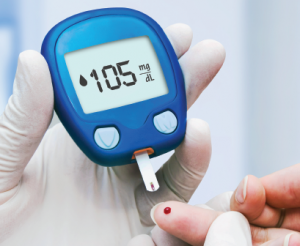
Rheumatologists need to contact the patient’s endocrinologist or primary care physician before starting glucocorticoids.
Piotr Adamowicz / shutterstock.com
In your daily contact with rheumatology patients, you likely come across several who have type 1 or 2 diabetes. Are you doing all you can to maximize their treatment?
Most physicians know about the damaging health effects of uncontrolled diabetes. From vision loss to kidney failure to nerve damage, those with diabetes require regular vigilance to minimize further health issues.
Because type 1 diabetes and many rheumatological health issues are autoimmune conditions, it’s not uncommon for patients with rheumatoid arthritis (RA), psoriatic arthritis or ankylosing spondylitis to have co-existing diabetes. Endocrinologist Joshua Miller, MD, medical director of diabetes care for Stony Brook Medicine in Stony Brook, N.Y., always asks patients with diabetes about a family history of autoimmune disease, because this may lead to a higher risk for concurrent autoimmune problems, including those within rheumatology.
The development of type 2 diabetes often increases with age, as well as obesity or a family history of diabetes. The number of Americans with type 2 diabetes is rapidly growing (see sidebar, right).
Endocrinologist Sofía E. Vasquez, MD, Tenet Florida Physician Services, Hialeah, Fla., estimates 25% of her patients have both diabetes and a rheumatological condition, particularly osteoarthritis or RA.
Endocrinologist Brenda M. Acosta, MD, Tenet Florida Physician Services, Doral, Fla., puts the estimate for her practice closer to 30%; conditions she sees most often include lupus, RA, fibromyalgia, osteoarthritis and gout.
A study published this year that focused on diabetes among those with RA found a 20% prevalence.1 Older patients, males, those with a higher body mass index and those in a lower socioeconomic level had a greater chance of having diabetes. Cardiovascular disease, depression and renal failure also were more common in patients with both diseases.
Patients with both lupus and diabetes may be less commonly seen; some studies point to the protective role of hydroxychloroquine against diabetes mellitus, says rheumatologist Anca D. Askanase, MD, MPH, clinical director and founder of the Columbia University Lupus Center and associate professor of medicine, Division of Rheumatology, Columbia University Medical Center, New York.
To improve care for patients with these concurrent and chronic diseases, The Rheumatologist asked several endocrinologists and rheumatologists for their advice. Here are their pearls.
1. Communicate before you start a patient on steroids.
On a weekly basis, Dr. Miller has patients with concurrent rheumatological disease or chronic obstructive pulmonary disease who get treated with a high dose of steroids. The patients’ blood sugars skyrocket between 300 and 600, and won’t budge. He sends them to the emergency department to get their blood sugar lowered. “It’s not an insignificant challenge that we face,” he says.



